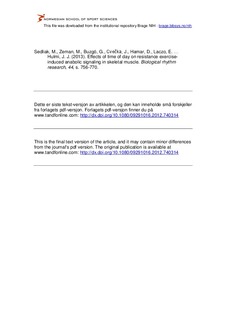| dc.contributor.author | Sedliak, Milan | |
| dc.contributor.author | Zeman, Michael | |
| dc.contributor.author | Buzgó, Gabriel | |
| dc.contributor.author | Cvečka, Ján | |
| dc.contributor.author | Hamar, Dušan | |
| dc.contributor.author | Laczo, Eugen | |
| dc.contributor.author | Zelko, Aurel | |
| dc.contributor.author | Okuliarová, Monika | |
| dc.contributor.author | Raastad, Truls | |
| dc.contributor.author | Nilsen, Tormod S. | |
| dc.contributor.author | Kyröläinen, Heikki | |
| dc.contributor.author | Häkkinen, Keijo | |
| dc.contributor.author | Ahtiainen, Juha P. | |
| dc.contributor.author | Hulmi, Juha J. | |
| dc.date.accessioned | 2014-03-10T14:17:52Z | |
| dc.date.available | 2014-03-10T14:17:52Z | |
| dc.date.issued | 2012-11-12 | |
| dc.identifier.citation | Biological Rhythm Research. 2013, 44, 756-770 | nb_NO |
| dc.identifier.uri | http://hdl.handle.net/11250/191468 | |
| dc.description | I Brage finner du siste tekst-versjon av artikkelen, og den kan inneholde ubetydelige forskjeller fra forlagets pdf-versjon. Forlagets pdf-versjon finner du på www.tandfonline.com: http://dx.doi.org/10.1080/09291016.2012.740314 / In Brage you'll find the final text version of the article, and it may contain insignificant differences from the journal's pdf version. The original publication is available at www.tandfonline.com: http://dx.doi.org/10.1080/09291016.2012.740314 | nb_NO |
| dc.description.abstract | This study examined the effect of morning versus afternoon exercise on acute responses in phosphorylation of proteins regulating muscle size and metabolism. Twenty-two untrained men, divided into the morning (n = 11) or afternoon (n = 11) group, performed maximal isometric leg extensions before and after resistance loading at 07:30–08:30 h and 16:00–17:00 h, respectively. Muscle pre- and postloading biopsies were analyzed for phosphorylated Akt, p70S6K, rpS6, p38 mitogen-activated protein kinase (MAPK), Erk1/2, and eukaryotic elongation factor (eEF) 2. Muscle force declined after exercise in both groups (p < 0.001). p70S6K Thr389 (p < 0.05) and Thr421/Ser424 and rpS6 (all p < 0.001) increased after exercise in both groups. The afternoon but not morning group showed postloading decrease (p < 0.05) and increase (p < 0.01) in eEF2 and p38MAPK, respectively. Akt and Erk1/2 were statistically unchanged. In conclusion, the time of day did not have an overall effect on protein synthesis signaling, but morning phosphorylated eEF2 and p38MAPK showed significantly larger between-subject variability in the exercise response compared to the afternoon. | nb_NO |
| dc.language.iso | eng | nb_NO |
| dc.publisher | Taylor & Francis | nb_NO |
| dc.subject | VDP::Matematikk og Naturvitenskap: 400::Basale biofag: 470 | nb_NO |
| dc.title | Effects of time of day on resistance exercise-induced anabolic signaling in skeletal muscle | nb_NO |
| dc.type | Journal article | nb_NO |
| dc.type | Peer reviewed | nb_NO |
| dc.source.journal | Biological Rhythm Research | nb_NO |
| dc.identifier.doi | 10.1080/09291016.2012.740314 | |
| dc.description.localcode | Seksjon for fysisk prestasjonsevne / Department of Physical Performance | nb_NO |
